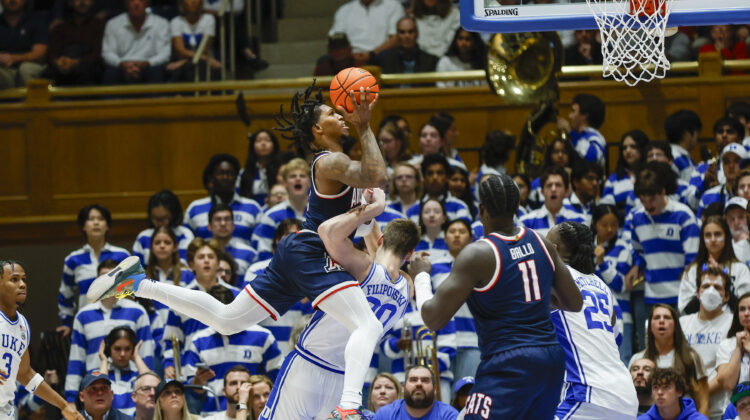Welcome to the Hotline’s projections for the toughest, most unforgiving conference in college basketball.
The Big 12 should start the 2024-25 season with at least five teams in the Associated Press Top 25 rankings and several more with reasonable paths into the NCAA Tournament.
Put another way: The Four Corners schools, which join the conference in August, will experience a grim reality on the court.
Arizona, so used to supremacy in the Pac-12, will be fortunate to finish in the top quarter of the Big 12.
Colorado, Arizona State and Utah all seem destined to finish closer to last place than first.
Their road games will be more difficult, of course, but winning at home should be vastly more challenging. With better coaches, deeper rosters and tougher players, the Big 12 possesses more teams capable of surviving hostile environments.
Our projections account for NBA Draft decisions and transfer portal movement and reflect unforgiving terrain for the Big 12 newcomers.
1. Baylor. Sure, you could make a strong case for Kansas. Our lean to Baylor is based on the returns of Langston Love and Jayden Nunn, plus the additions of Duke guard Jeremy Roach and Miami big man Norchad Omier. And don’t forget about wing Jalen Celestine, either. The Cal transfer averaged 13.5 points in two games against Arizona last season. If the Bears don’t finish on top, they surely will land on the top tier unless injuries wreck the season.
2. Kansas. No team in the Big 12 (new or old) more effectively revamped its roster during the spring tumult. KU convinced big man Hunter Dickinson to return and landed three high-impact transfers in AJ Storr (Wisconsin), Zeke Mayo (South Dakota State) and Rylan Griffen (Alabama).
3. Iowa State. The Cyclones have two elite guards, Tamin Lipsey and Keshon Gilbert, and owned the best defense in the country last season, according to the Pomeroy adjusted efficiency metrics. If they elevate the offensive production — in particular, their 35 percent shooting from 3-point range — the coveted regular-season title just might find its way to Ames.
4. Houston. Here’s a great example of the Big 12’s strength at the top: The Cougars return several key pieces from a roster that earned a No. 1 seed in the NCAAs, including guard L.J. Cryer, but they are merely one of several contenders for the crown. If Oklahoma transfer Milos Uzan manages to fill one of Jamal Shead’s shoes, much less both, watch out.
5. Arizona. The Wildcats would be the clear favorites to win the Pac-12 in 2024-25, especially with guard Caleb Love withdrawing from the NBA Draft. But are they deep enough and tough enough to win consistently on the road — a prerequisite for any team planning to contend for the top shelf of the Big 12 race? We aren’t convinced.
6. Cincinnati. The Bearcats look like a fringe Top 25 team in coach Wes Miller’s fourth season, thanks partly to the arrival of Texas guard Dillon Mitchell but mostly to experience. UC was 7-11 in conference play last year, with eight of the losses by five points or less. Turn a few of those defeats into wins, and a top-half finish should follow.
7. Texas Tech. One of the most difficult teams to project because so much of TTU’s success depends on steady play from a single transfer (forward JT Toppin) from a school (New Mexico) outside the power leagues. If he can withstand the Big 12 grind and mesh with the returnees, the Red Raiders will muscle their way into the race. An upside surprise is a distinct possibility in Lubbock.
8. Brigham Young. Our outlook for the Cougars took a turn for the dreary after Mark Pope left for Kentucky and took top scorer Jaxson Robinson with him. Coach Kevin Young retooled the roster deftly but lacks the quality depth needed for BYU to be considered a contender. That said, the forecast in Provo is far brighter than in Salt Lake City.
9. TCU. Point guard Frankie Collins doesn’t count as an intra-conference transfer because he jumped from Tempe to Fort Worth this spring, before Arizona State became an official member of the Big 12. But Collins, who averaged 14 points per game and plays first-rate defense, is well suited for his new league and will help TCU’s cause immensely.
10. Kansas State. The upcoming season is critical for coach Jerome Tang, whose team finished third in his rookie year (2023) but plunged to ninth last season. And we aren’t sure the Wildcats, smacked by attrition in April, have the ingredients necessary to reclaim lost ground.
11. UCF. Like Cincinnati, the Knights struggled for traction in their inaugural year in the Big 12 and lost a slew of close games. In that regard, they aren’t complete outliers — the trajectory of every season turns on a handful of plays. For UCF to be a factor in the race, guards Jaylin Sellers and Darius Johnson must make big shots more often than not.
12. Arizona State. Considering the state of ASU’s roster early in the offseason cycle, this position constitutes a victory for Bobby Hurley and Co. The Sun Devils landed five-star big man Jayden Quaintance and grabbed several impact players from the transfer portal. The additions should create a reasonable floor, but we question the height of the ceiling.
13. West Virginia. Eight transfers will form the bulk of new coach Darian DeVries’ roster, and the group includes his son, Tucker, the former Drake star. The changes should be enough to power the Mountaineers out of the Big 12 cellar but not enough — not nearly enough — to make the program relevant.
14. Utah. We cannot imagine Craig Smith is thrilled about the move into the Big 12 — it makes his vital fourth season that much more difficult. The departures of assistant coach Chris Burgess, big man Keba Keita and guard Deivon Smith add to a daunting challenge. Our view: Any short list of Big 12 coaches on the hot seat entering 2024-25 should include Smith. He can’t afford regression, yet regression seems inevitable.
15. Colorado. Few programs sustained as much attrition as the Buffaloes, who lost three major talents to the NBA (Cody Williams, KJ Simpson and Tristan da Silva) and other key players to the transfer portal. Veteran coach Tad Boyle’s situation would have been tough enough in the Pac-12. In the Big 12, forget it.
16. Oklahoma State. The bottom of the Big 12 will be far stronger than the bottom of any other conference, and the Cowboys are the best bet to occupy that bottom. Adding to the uncertainty: First-year coach Steve Lutz has zero experience running a power conference program. The transition won’t be smooth.
*** Send suggestions, comments and tips (confidentiality guaranteed) to pac12hotline@bayareanewsgroup.
*** Follow me on Twitter/X: @WilnerHotline
*** Pac-12 Hotline is not endorsed or sponsored by the Pac-12 Conference, and the views expressed herein do not necessarily reflect the views of the Conference.
Related posts:
 Pac-12 basketball: Hot Seat update as the conference season begins
Pac-12 basketball: Hot Seat update as the conference season begins

Arizona State guard Frankie Collins, Jan. 14, 2023. (AP Photo/Amanda Loman)
Pac-12 rewind: UCLA sweeps, Utah stumbles, ASU keeps pace and Oregon’s wild ride rolls on
(AP Photo/Mike Stewart)
Pac-12 expansion: San Diego State reaches the Final Four and stamps its credentials for membership Wilner Mailbag: Chips for the Pac-12’s future, media rights timing, SMU’s value, Colorado replacement options and more
Wilner Mailbag: Chips for the Pac-12’s future, media rights timing, SMU’s value, Colorado replacement options and more

